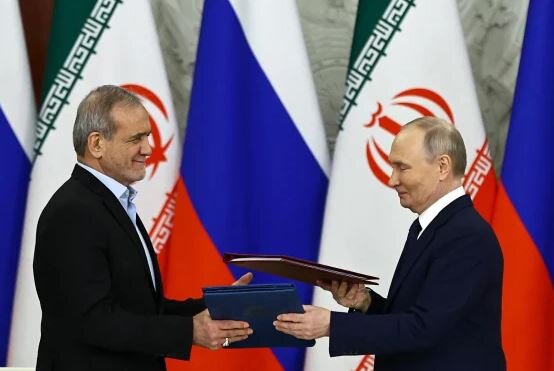New IranRussia partnership treaty reflects current state of bilateral ties says Russian analyst
New Iran-Russia partnership treaty reflects current state of bilateral ties, says Russian analyst
TEHRAN – During an interview with the Tehran Times, Vladimir Sazhin, a Sputnik columnist and senior researcher at the Institute of Oriental Studies of the Russian Academy of Sciences, stated that the comprehensive strategic partnership treaty recently signed in Moscow by the presidents of Iran and Russia demonstrates the evolving relationship between the two countries by addressing issues less relevant than those addressed in the 2001 strategic pact.

Sazhin noted that the emergence of terrorism and extremism, and the subsequent need for collaborative counter-terrorism efforts, are among the issues that have gained prominence since 2001.
He, however, noted that the main focus of the treaty is trade, with a particular emphasis on energy and the International North-South Transport Corridor.
Read the full text of Sazhin’s interview with the Tehran Times below:
How does this agreement represent a departure from previous patterns of collaboration or understanding between these two nations?
In general, the Agreement reflects the existing relations between the Russian Federation and Iran in recent years. If we recall the Russian-Iranian Treaty of 2001, the new document more carefully outlines the issues of ensuring territorial integrity, combating terrorism and extremism, and close cooperation between the two countries in countering modern global challenges and threats. This is natural and understandable, 25 years ago these factors did not play the role they play today.
How does this agreement reshape the existing power dynamics in West Asia and Central Asia?
Perhaps not at all. Since the Agreement does not provide for a military alliance, and the economic articles focus on bilateral relations that do not particularly affect the situation in Western and Central Asia.
With both Iran and Russia facing significant economic sanctions, what potential economic advantages are anticipated for each country as a consequence of this agreement?
The Agreement provides the legal basis for the initiation, creation, and implementation of many projects in almost all areas of trade and economic cooperation. But it seems that the main ones are: the whole range of measures to improve the efficiency of the International North-South Transport Corridor and plans to expand and deepen cooperation in the field of energy, primarily in the gas sector.
To what degree does this agreement reflect a genuine alignment of strategic priorities between Iran and Russia? Are there areas where their long-term interests could potentially diverge, leading to future tensions or friction?
The coincidence of strategic priorities between Iran and Russia is primarily based on the political, economic, and military confrontation with the West. In this regard, it cannot be ruled out that both Moscow and Tehran, due to various internal or external circumstances, may in the future change the shades of their policy towards the West, which will bring to the fore other problems that may not be adequate to the joint interests of the two countries. If we do not delve into the context, then we can name at least three areas: the Iranian nuclear problem, Russia's relations with Israel, and the way to solve the Palestinian problem.
Looking at the bigger picture, how sustainable and enduring is this burgeoning strategic partnership between Iran and Russia? What crucial factors are likely to dictate its future evolution?
Everything will depend on the development of the situation in the world, in the Middle East, on the policies of the new US President Donald Trump, and the policies of China (the influence and role of these superpowers in world politics cannot be denied). And also, will depend on the development of the internal political situation in Iran itself, which is currently not very stable, including in terms of developing relations with Russia.
source: tehrantimes.com